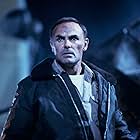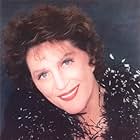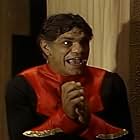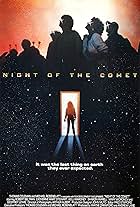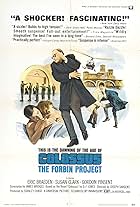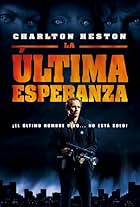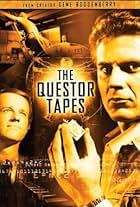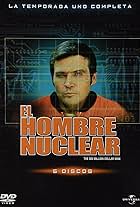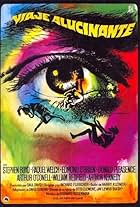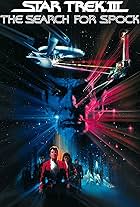Agrega una trama en tu idiomaA 20th Century man wakes up in 2133, where men are slaves and women rule.A 20th Century man wakes up in 2133, where men are slaves and women rule.A 20th Century man wakes up in 2133, where men are slaves and women rule.
- Dirección
- Guionistas
- Elenco
Jo de Winter
- Villar
- (as Johana De Winter)
Corinne Camacho
- Bronta
- (as Corrine Camacho)
Sue Dahlman
- Thetis
- (as Sara Chattin)
Robert Sutton
- Kreeg Captain
- (as Raymond Sutton)
Opiniones destacadas
This might be enjoyed best as a review of 40-year old television effort. Gene Roddenberry is best remembered for Star Trek, but this Air Force veteran was writing well before the 1966 show hit the airwaves.
"Planet Earth" can be enjoyed on its own, but I got the opportunity to watch "Genesis II" first. Both these television pilots are based on the same story of a scientist suspended in time for 160 years. The world has mostly destroyed itself and we're invited for a collection of never-to-appear stories of the survivors bringing mankind back.
This story premise and those from Star Trek pivot on some type of Third World War wiping about most of our civilization. While Star Trek plots all seems to share the idea that mankind has evolved into a better kind of person, Planet Earth did not display that sensation to me; and maybe that's the problem. The illusion of an improved man seemed to led the following of Trekkers, plus the boundless story opportunities of visiting other planets. There was no way to expect that sense of wonderness with this story. Even though this future is probably a truer presentation of mankind following such a war, people like illusions and the lies to make us feel better.
Also interesting to see is the kind of loyalty Roddenberry has with actors. Like using DeForest Kelley, Leonard Nimoy, Nichelle Nichols and Majel Barrett (who he later married) on previous projects and then including them in Star Trek, Planet Earth cast includes Star Trek Alumni Diana Muldaur, Ted Cassidy and of course Majel.
I don't recall seeing either of the pilots (Genesis II or Planet Earth) in 1974 but I'm fairly sure I wouldn't been very intrigued by them. Roddenberry's humanists views are quite evident in all his material, which can make it difficult to fully engage in his stories. Star Trek, for the most part, worked well -- Planet Earth didn't. John Saxon acting and fight-scenes are better in other productions. Diana Muldaur is a very strong actress with great presence, but her character here was tiresome and I just wanted her to go away. I was looking forward to anything interesting for Ted Cassidy, but we barely see him.
So if you're interested in shows from the 70s or in Roddenberry, watch Planet Earth and possible Genesis II, but don't be disappointed that a new story franchise was not born.
"Planet Earth" can be enjoyed on its own, but I got the opportunity to watch "Genesis II" first. Both these television pilots are based on the same story of a scientist suspended in time for 160 years. The world has mostly destroyed itself and we're invited for a collection of never-to-appear stories of the survivors bringing mankind back.
This story premise and those from Star Trek pivot on some type of Third World War wiping about most of our civilization. While Star Trek plots all seems to share the idea that mankind has evolved into a better kind of person, Planet Earth did not display that sensation to me; and maybe that's the problem. The illusion of an improved man seemed to led the following of Trekkers, plus the boundless story opportunities of visiting other planets. There was no way to expect that sense of wonderness with this story. Even though this future is probably a truer presentation of mankind following such a war, people like illusions and the lies to make us feel better.
Also interesting to see is the kind of loyalty Roddenberry has with actors. Like using DeForest Kelley, Leonard Nimoy, Nichelle Nichols and Majel Barrett (who he later married) on previous projects and then including them in Star Trek, Planet Earth cast includes Star Trek Alumni Diana Muldaur, Ted Cassidy and of course Majel.
I don't recall seeing either of the pilots (Genesis II or Planet Earth) in 1974 but I'm fairly sure I wouldn't been very intrigued by them. Roddenberry's humanists views are quite evident in all his material, which can make it difficult to fully engage in his stories. Star Trek, for the most part, worked well -- Planet Earth didn't. John Saxon acting and fight-scenes are better in other productions. Diana Muldaur is a very strong actress with great presence, but her character here was tiresome and I just wanted her to go away. I was looking forward to anything interesting for Ted Cassidy, but we barely see him.
So if you're interested in shows from the 70s or in Roddenberry, watch Planet Earth and possible Genesis II, but don't be disappointed that a new story franchise was not born.
Yet another of Gene Roddenberry's post-'Star Trek' attempts at a series, 'Planet Earth' is generally agreeable entertainment, although nothing special. It gets most of its juice from its digs at sexual politics. Obviously low-budget, it doesn't feature much in the way of futuristic environments, or costumes, or special effects. It is definitely fun in a cheesy, well-meaning sort of way, and it does NOT skimp on sex appeal, with appropriate eye candy for men and women alike.
The almighty John Saxon stars as Dylan Hunt, a man who went into suspended animation in 1979, and was awakened in the 22nd century. Now, a post-"conflict" Earth is divided into societies both advanced and primitive. One such society is matriarchal in nature, with all the males kept drugged up and submissive. The virile, studly Hunt is considered good breeding stock by these women. One lady in particular, Marg (Diana Muldaur, who went on to a role on 'Star Trek: The Next Generation' the following decade), is especially taken with Hunt.
A rich cast of familiar faces (Janet Margolin, Ted Cassidy, Christopher Cary, Majel Barrett, Jim Antonio, John Quade) helps to make this easy enough to watch, even though it's just as easy to forget. One good thing about TV movies from this era is their brief running times, so there's less chance of them wearing out their welcome. 'Planet Earth' is adequately paced, but its real strongest suit is its sense of humour. As I already said, some of the cast members are very attractive, so that helps as well; Muldaur is quite striking as the leader of these women.
One thing this viewer liked was the idea that all major population centres on Earth are connected by these underground tunnels, through which Hunt and others travel as if they were subways.
Six out of 10.
The almighty John Saxon stars as Dylan Hunt, a man who went into suspended animation in 1979, and was awakened in the 22nd century. Now, a post-"conflict" Earth is divided into societies both advanced and primitive. One such society is matriarchal in nature, with all the males kept drugged up and submissive. The virile, studly Hunt is considered good breeding stock by these women. One lady in particular, Marg (Diana Muldaur, who went on to a role on 'Star Trek: The Next Generation' the following decade), is especially taken with Hunt.
A rich cast of familiar faces (Janet Margolin, Ted Cassidy, Christopher Cary, Majel Barrett, Jim Antonio, John Quade) helps to make this easy enough to watch, even though it's just as easy to forget. One good thing about TV movies from this era is their brief running times, so there's less chance of them wearing out their welcome. 'Planet Earth' is adequately paced, but its real strongest suit is its sense of humour. As I already said, some of the cast members are very attractive, so that helps as well; Muldaur is quite striking as the leader of these women.
One thing this viewer liked was the idea that all major population centres on Earth are connected by these underground tunnels, through which Hunt and others travel as if they were subways.
Six out of 10.
Apparently, networks at the time were only comfortable with one sci-fi series at a time.
CBS picked "Planet of the Apes" over Genesis II, and ABC picked "Six Million Dollar Man" over Planet Earth.
The main character in each was Dylan Hunt, though they were played by different actors. This is interesting because when Roddenberry made the second Star Trek pilot, he gave the new lead actor a new name. (Capt. Pike became Capt. Kirk)
The name Dylan Hunt would be used in Andromeda, which was an outer space version of Planet Earth, which in turn was a land-based version of Star Trek.
The script for Star Trek: The Motion Picture was based on an unused Planet Earth script. In fact, several of the first season episodes of ST: TNG were written for either the unrealized new Star Trek series in the 70s, or Planet Earth,
Roddenberry believed in recycling.
CBS picked "Planet of the Apes" over Genesis II, and ABC picked "Six Million Dollar Man" over Planet Earth.
The main character in each was Dylan Hunt, though they were played by different actors. This is interesting because when Roddenberry made the second Star Trek pilot, he gave the new lead actor a new name. (Capt. Pike became Capt. Kirk)
The name Dylan Hunt would be used in Andromeda, which was an outer space version of Planet Earth, which in turn was a land-based version of Star Trek.
The script for Star Trek: The Motion Picture was based on an unused Planet Earth script. In fact, several of the first season episodes of ST: TNG were written for either the unrealized new Star Trek series in the 70s, or Planet Earth,
Roddenberry believed in recycling.
It plays kind of like a rejected Star Trek episode, but not one of the better ones but that does give it a bit of nostalgia value. The opening is loaded with voice over narration to explain the whole set up for those who didn't watch Genesis 2 the previous year. The basic idea is the same as one Rod Serling had for a series or show that he never had an ending for, that didn't stop Roddenberry. Of course since this is kind of weak stuff the network actually let Roddenberry have two pilots but it still didn't go to series.
This also shows where some of the "new" ideas for the first Star Trek film came from. The enemy characters have a sort of spine on their bald foreheads like the Klingons soon would have and the main uniforms are sort of the same "Jammies" that the first Star Trek feature featured.
It's poorly structured with characters disappearing for long periods of time and the whole thing stops totally dead during the horny Roddenbery staple which was part of all his things during this period of time. That would be the scene where the man has to prove he's the world's greatest lover to the less experienced woman to save the day. And it takes forever for this section to be over with. It just seems like dirty old man material, kind of leering and juvenile at the same time.
John Saxon does strike some good Kirk poses and it's nice to see Cassidy with a meaty role--he does a couple of impressive stunts during the big brawl ending.
This really feels like the Planet of the Apes series that came shortly after this.
It's perfectly fine this didn't go to series, too bad that far superior Spectre and Questor Tapes didn't even get 2 chances that this one didn't deserve.
This also shows where some of the "new" ideas for the first Star Trek film came from. The enemy characters have a sort of spine on their bald foreheads like the Klingons soon would have and the main uniforms are sort of the same "Jammies" that the first Star Trek feature featured.
It's poorly structured with characters disappearing for long periods of time and the whole thing stops totally dead during the horny Roddenbery staple which was part of all his things during this period of time. That would be the scene where the man has to prove he's the world's greatest lover to the less experienced woman to save the day. And it takes forever for this section to be over with. It just seems like dirty old man material, kind of leering and juvenile at the same time.
John Saxon does strike some good Kirk poses and it's nice to see Cassidy with a meaty role--he does a couple of impressive stunts during the big brawl ending.
This really feels like the Planet of the Apes series that came shortly after this.
It's perfectly fine this didn't go to series, too bad that far superior Spectre and Questor Tapes didn't even get 2 chances that this one didn't deserve.
This is a tough-minded and quite intelligent script, by Juanita Bartlett and Gene Roddenberry. It is, as those who have seen "Genesis II" and an inferior sequel know, the second attempt to create a pilot film that would sell as a television series. It might be instructive I suggest to study the primary changes made from the first to the second attempt; this one was written not as an original concept but from a story treatment called "Poodle Shop" that was one of more than a dozen developed by Gene Roddenberry, when he had hoped "Genesis II" might be picked up by a network's 'tsars' under its unarguably better title. First, we have John Saxon a suspended-in-cryogenics 20th century scientist Dlan Hunt instead of Alex Cord, an improvement in accent and general acting. Second, we start with Hunt in the 22nd century, not in his own time. Third, he is here a member of a Pax City team, one of many that comb the world from their southwestern location in North America discovering what changes a 150-plus year period has made after a devastating nuclear conflict altered the lives of the planet's peoples. Ecologically, the world has been given a second chance; but there are strange peoples, tribes and cities everywhere. Fourth, he is accepting from the beginning the idea championed by Pax not to use force for its ends, a notion which he did not buy in the first script. And fifth, the aristocratic aliens of the city of Tyrania have been replaced as villains in this feature by Kriegs, aliens with a raised skull ridge whose mutation leads them to be warlike, not very bright and just smart enough to run wood-burning war-vehicles, cars kept running somehow, for their purposes of enslaving everyone they meet. The story-line involves Pater (formerly "Primus" in the first film) Kimbridge being grievously injured during a Krieg attack away from Pax. The Team tries to get him away by diverting the Kriegs, but by the time they get him into sub-shuttle tunnels and back to Pax, he is beyond all but the best medical help. Since he is Pax's leader, Hunt takes the team, consisting of a giant white Indian, a skinny blond cockney and a young female unisex worshiper of St. Freud in search of the doctor they need, who had been reported lost a long while ago in a nearby territory. They know only that it is a zone ruled by a matriarchy, so they plan to try to penetrate it several ways. Harper-Smythe, played by Janet Margolin plays her role by ear, asking to join the group and having to fight to defeat a challenger. Having done so, she is warmly welcomed into a home, where she finds men are slave-servants, kept in check emotionally by a special gruel that saps resolve when they ingest it. Hunt tries his own entry and with his men he is captured and tossed into a pen with other slaves, bossed over by lovely Johana De Winter as Villar. He is vended to Marg, the best warrior of the Confederacy of Ruth; and all the women slave-owners can talk about is that there is too-much resolve being removed from their males, "dinks", since no babies are being born. Hunt is fed the gruel and gets frightened; but he fights it with better results than others have, and learning what it is, he avoids a second dose. He also finds the missing doctor. He plays on Marg's pride by telling her of his fantastic prowess as a lover; angrily, she lets him come to her and show her his method--it is booze. They get closer and closer to the right moment of "balance", and when he is inebriated and ready--she has fallen asleep entirely. The next day, Harper-Smythe challenges Marg for her "dink", her slave, and defeats her. It is soon after that the Kriegs attack; Hunt and his team, the others also captured, fight, with Harper-Smythe's help. even the male slaves joining in. The old way it now seems will be altered in the Confederacy; and Marg invites Hunt to visit any time and finish the experiment. "On balanced terms?" he asks. "On any terms", she adds. Then they have rescued their medical man, so they take him back to Pax City. Will they be in time to save the Pater? There is little music, but what there is is good. The film was decently directed by Marc Daniels, who is better with actors than camera angles, a veteran of "Star Trek" assignments. Costumes were provided as in the first pilot by "Star Trek" costumer William Ware Theiss and they are very imaginative indeed. The very fine alien set decorations were the work of Edward Baer. Among the cast, Jo De Winter is superb, and Diana Muldaur very good as the fiery Marg. Others in the mix include Ted Cassidy as Isiah the white Indian, Christopher Cary as the new team member, Baylok, Sally Kemp as Treece, Harper-Smythe's hostess, Claire Brennan, Corinne Camacho, Majel Barrett as the new Pax Security Chief and Aron Kincaid and Jim Antonio in support. This is an interesting, often thoughtful attempt I assert to make a feature-length film of an intended series episode. The color in the effort is pretty, but perhaps it belonged in B/W as a drama; however, the unusual use of comedy in the sexually-charged portions works rather well because it is kept satirical. "Women's lib--or women's lib gone mad?" Hunt asks at one point. This entertaining and well-mounted story does a good job of presenting the women's reasons for suppressing males--who had all-but-destroyed the Earth with their wars. Their way, historically, seemed to be better; but as Hunt reminded the Confederacy's members, there are other ways to rule men than by drugging their food, for a real woman.
¿Sabías que…?
- TriviaThe plot was based on a story premise for 'Genesis II' called "The Poodle Shop", which was in turn based on an unused story idea ("The Pet Shop") in Gene Roddenberry's original pitch for Viaje a las estrellas (1966).
- ConexionesFollows Genesis II (1973)
Selecciones populares
Inicia sesión para calificar y agrega a la lista de videos para obtener recomendaciones personalizadas
Detalles
Contribuir a esta página
Sugiere una edición o agrega el contenido que falta

Principales brechas de datos
By what name was Planet Earth (1974) officially released in India in English?
Responda







